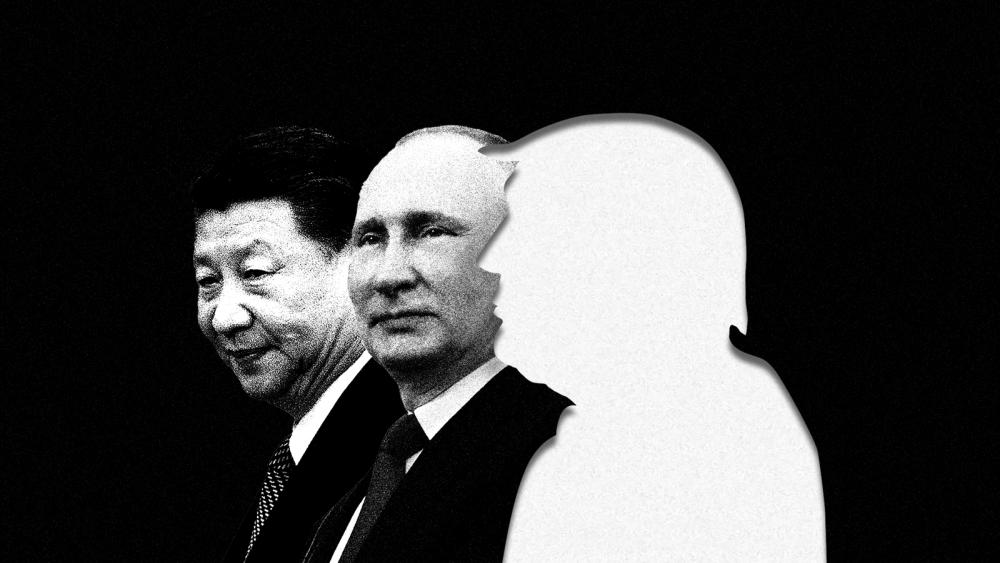
===
The Triad of Power and the Peace of Nations: A Reflection on China, Russia, and the United States Peace Making Diplomacy
Between War and Peace, a Divine Moment
In a world teetering on the edge of multipolar conflict, the statement made by China's foreign minister to the EU's foreign policy chief in July rings as both revelation and warning: China cannot afford to see Russia defeated in Ukraine because that would allow the United States to turn its full attention to Beijing. Beneath this strategic calculation lies a troubling comfort with ongoing wars so long as it does not spiral out of control.
What, then, are we to make of this triad: China, Russia, and the United States—whose geopolitical dance holds the fate of the world in precarious balance? And how might divine values, rooted in justice, unity, humility, and wisdom, reshape this modern Tower of Babel before it collapses under its own ambition?
I. Babel Revisited: The Theological Dimension of Global Disunity
The ancient story of the Tower of Babel (Genesis 11:1–9) offers a theological lens through which we can understand the dysfunction of modern international relations. In Babel, humanity sought unity without humility, power without accountability. God’s disruption of the project was not merely punitive; it was preservative. The scattering of languages was a divine safeguard against the dangers of centralized, unchecked power.
Today, the triad of the U.S., China, and Russia mirrors Babel in their pursuit of influence and security through rivalry rather than relationship. Each seeks to protect its civilization from domination by the others, even at the cost of prolonging conflict elsewhere. This is a new Babel; not of bricks and mortar, but of nuclear stockpiles, proxy wars, and ideological posturing.
The lesson of Babel is clear: any unity or global system that exalts self-interest above divine justice and shared humanity is doomed to fracture. The peace of the world cannot be built on a structure of fear or coercive alliances.
Diplomacy Under Divine Light: The Ethical Mandate of Strategic Restraint
Diplomacy must now move beyond transactional interest to covenantal responsibility. True diplomacy is not merely the prevention of war—it is the cultivation of peace through truth, trust, and transparency. China’s quiet preference for a “contained conflict” in Ukraine reveals the dangerous logic of strategic prolongation, a realpolitik calculus that tolerates suffering in one theater to deter engagement in another.
This logic is morally untenable and geopolitically unstable.
To prevent the 21st-century equivalent of a Babel-collapse, a new diplomatic ethic is required: one that views peace not as a tactical pause between wars but as the fundamental duty of nations under God and before humanity. The West must resist the temptation to outmaneuver China and Russia by exploiting divisions; instead, it should pursue creative de-escalation grounded in:
Philosophical Foundations: From Zero-Sum to Mutual Flourishing
From a philosophical standpoint, peace can no longer be understood in zero-sum terms. The ancient Greco-Roman and Confucian traditions both teach that true power lies not in domination, but in virtue, restraint, and harmony. Similarly, Christian theology affirms that blessed are the peacemakers (Matthew 5:9), not the power-brokers.
Yet modern power politics is addicted to the illusion of permanent strategic advantage. The fear that a defeated Russia would free the U.S. to contain China reveals the fragility of a system where nations act not for global stability but for post-war positioning.
A new international philosophy must arise: one of mutual vulnerability, where nations recognize that their survival is intertwined, and their moral credibility depends on the care they extend even to their adversaries. The war in Ukraine, like a fault-line in a tectonic system, threatens to unleash broader conflicts if not mended by such a philosophy.
The United Nations at the Crossroads: From Forum to Faithful Mediator
The United Nations was born from the ashes of Babel-like wars. But it has too often functioned as a chamber of performance rather than transformation. If the U.N. is to fulfill its divine mandate as a guardian of peace, several reforms are necessary:
A Divine Peace Proposal for the Triad
To guide the peace of the world, let us propose a Covenant of Strategic Restraint and Moral Dialogue, to be endorsed by China, Russia, and the United States, under U.N. facilitation and divine moral vision. This covenant would include:
Conclusion: The Call of Heaven Amid the Clamor of Nations
We stand at a decisive hour. The triad of China, Russia, and the United States bears the power to destroy or redeem. Their choices will echo into the lives of billions. Yet beyond the strategies of generals and the protocols of diplomats stands the eternal truth: peace is not merely the absence of war but the presence of justice, mercy, and shared destiny under God.
Let the West remember Babel, and choose to speak with wisdom, not weapons. Let the East remember that harmony without truth becomes tyranny. And let the world remember that the Prince of Peace still calls nations to beat their swords into ploughshares (Isaiah 2:4), before the tower falls again.
Written under the conviction that diplomacy without theology is blind, and theology without diplomacy is empty.
Edward-t Moises
Stay connected and informed! By subscribing to Orpe Advocates, you'll receive the latest updates, news, and insights on our ongoing efforts to defend justice, promote human dignity, and empower communities. Be part of our mission for change. Subscribe today and never miss an important update!
Comments